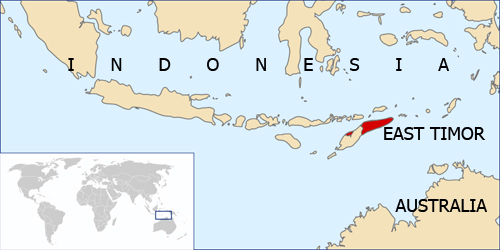Timor-Leste’s prosecutor- general, Longuinhos Montiero, has now issued 12 arrest warrants for suspects in the 11 February assassination attempts against President Jose Ramos-Horta and Prime Minister Xanana Gusmao.
Montiero expects to issue five more in the immediate future, and one other warrant is pending, awaiting further investigation.
One of those already issued is for renegade army commander Alfredo' Reinado's ally, former Lieutenant Gastao Salshina, who is suspected of leading the attack against Xanana Gusmao's convoy.
Hermanprit Singh, deputy UNPol (UN Police) commissioner, said security forces were in the process of hunting down the suspects.
"We don't need to wait. We, the international security forces, are actually in hot pursuit."
Singh said it was unclear whether the 11 February attacks were an assassination attempt or an attempted kidnapping gone wrong.
"What was the group motivated by… it's a matter of investigation," Singh said.
Revenge attacks
The situation in Dili has remained calm since the attacks with a state of emergency declared for another eight days and an overnight curfew. Nonetheless, local Timorese are beginning to fear Reinado's supporters may retaliate against the Timor-Leste Defence Force (FFDTL) and the International Stabilisation Forces (ISF).
IRIN talked to one of the “petitioners” dismissed from the defence force in 2006, and a strong supporter of Reinado. Only using the name Jose, the former defence force soldier vowed to continue to fight for justice against what he perceived as discrimination in the military against those from the western part of the country.
"Since the attack on Monday [11 February], I've been very sad,” Jose said. “I feel very sorry… one of our best commanders died in the attack."
He said he has not heard of any plans from his group's leaders to launch reprisal attacks.
Split
Jose confirmed one rumour that had been making the rounds that there had, indeed, been a split, prior to the 11 February attacks, amongst the petitioning soldiers who supported Reinado. Last week, he said, around 90 of the “petitioners” came to Dili to begin dialogue with the prime minister, against the will of Reinado and the other 500 “petitioners”.
Speculation
Meanwhile, speculation continues as to the possible motives for the attacks.
Media reports have suggested that the attackers were not trying to kill the president and prime minister but take them alive as part of an attempted coup.
There have also been allegations that opposition party Fretilin, paid Reinado and his followers millions of dollars to kill the country’s leaders. Fretilin has denied the allegations and said they are defamatory.
Dialogue
What is clear is that Reinado had been engaged in peaceful talks with both Timor-Leste's president and prime minister as recently as December 2007, and last met government officials on 6 February.
Joaquim Fornseca, the prime minister's civil society adviser, and leader of the government-appointed Task Force established to resolve the issues raised by Reinado and the petitioning soldiers, told IRIN, that in recent weeks, many of the petitioning soldiers had been approaching the Task Force to engage in dialogue with them after realising that Reinado was not genuinely interested in helping them resolve their problems.
"In December - when both Alfredo and Salshina did not show up to the meeting we organised between them, the prime minister and the commander of FFDTL - some of them [“petitioners”] started to wonder if Reinado was really serious in fighting for their cause." He said the government's attempts to entice his supporters away from him might have sparked Reinado’s anger.
Fornseka also said that in a meeting between Ramos-Horta and Reinado in December 2007, the president had made a promise to Reinado that he and his supporters would be automatically reinstated in the military.
"I don't blame the president,” Fonseca told IRIN, but there were some concessions that could not be delivered, and I think Reinado felt betrayed in a way."
He said the Task Force had come a long way in getting the FFDTL to allow the petitioning soldiers to re-apply to join the army, but that FFDTL would never agree to simply reinstate them without application or screening process.
While there was some concern that the burial services for Reinaldo on 14 February might spark violence, thousands of his supporters gathered peacefully at a service at his home. They chanted "Viva Alfredo" as his coffin, draped with a Timor-Leste flag, was buried in his front garden.
sm/bj/cb
This article was produced by IRIN News while it was part of the United Nations Office for the Coordination of Humanitarian Affairs. Please send queries on copyright or liability to the UN. For more information: https://shop.un.org/rights-permissions




